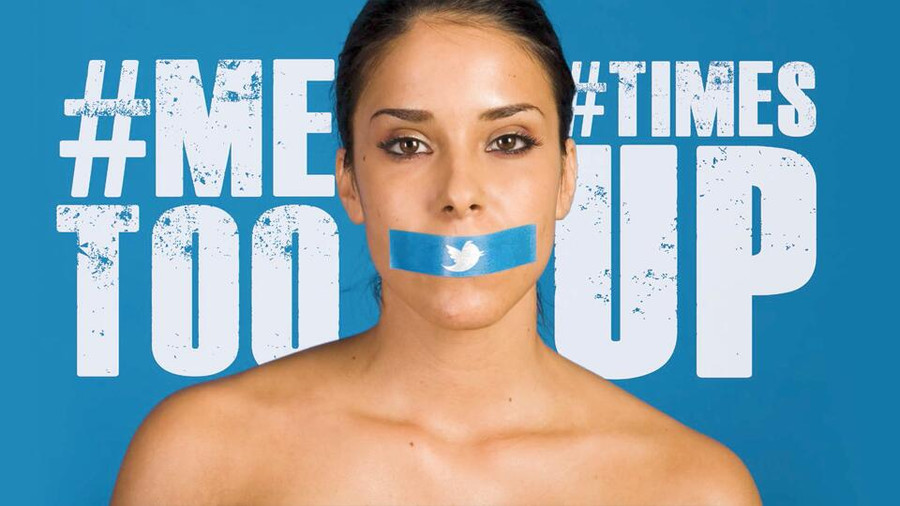When I found out that nude footage of me in a VR video project had screened at Austin’s South by Southwest without my consent, I had to make a decision made by many women in the last year about going public with a #MeToo moment.
Many sex workers have felt left out of the conversation just because of the perception of our career. But I had to consider another thing many people outside the porn industry don’t — my use of the hashtag wouldn’t actually show up on Twitter. For whatever reason, I’m not allowed in the conversation. Why? I’m shadowbanned.
As tech companies struggle with how to effectively moderate their platforms, let’s hope they don’t hurt one of society’s most vulnerable populations in the process.
On Twitter, posting nude and/or sexual photos, automated posts and retweeting other sex workers frequently seems to trigger shadowbanning. Exactly what causes Twitter to shadowban your account is unclear — they don’t even admit to doing it. Shadowbanning essentially results in your posts and profile being hidden in Twitter’s search functionality.
So, when someone searches “karinawhite90,” the Twitter name of a performer who contacted me to share her experience, her profile doesn’t show up. None of her tweets show up. And say, for example, she wants to use a hashtag like “#TimesUp” in one of her tweets — that won’t show up either. The result? Sex workers are ghettoized, their posts considered not fit for public consumption.
Karina told me she thought she was shadowbanned for trying to keep other sex workers safe. “I realized I was, after I retweeted a post that had a man’s info on it, to warn girls that he was a rapist,” she said. She thought that perhaps sharing his personal information was breaking a rule against doxxing, or exposing personal information.
“I really don’t know why they did it, as they don’t give anyone any information when it happens,” she continued. “I also don’t know how long it’ll be implemented onto my account.” For Karina, there’s no clear way back.
Being shadowbanned means that sex workers have a harder time getting the word out about abusers within the industry, making it easier for them to target newcomers. A newcomer is less likely to be friends already with established workers on Twitter, and so may not see their posts in the search. It’s as if someone had programmed in the worst aspect of whisper networks — they don’t help people outside the network.
This separation of sex workers from everyone else, of course, also contributes to the stigmatization that sex workers as a whole face. When the hashtag #QuestionsForAProstitute trended to the top of Twitter on December 29, full service sex workers were frustrated by the fact that they couldn’t actually answer people’s genuine questions and correct those who were spewing false information. The hashtag instead was a dumpster fire of misogynistic slurs and violent “jokes.” Apparently, those people weren’t shadowbanned.
Being personally hidden also means that people are unable to see and interact with sex workers on a platform where they often display their humanity, and not just be decontextualized sex objects to be consumed. Aside from politics and entertainment, Twitter is for the mundane details of life that let people feel connected to others. Twitter is currently treating sex workers like products of the sex industry, to be shelved in their own section, rather than people who do sex work, but need to participate in everything else online too.
Finally, it also impacts people’s ability to make a living. Since tube sites have dramatically changed the porn industry, many sex workers have turned to Twitter to advertise their work. It turns out that making a more personal connection with someone makes them way more likely to spend money on you! As many companies develop fun and engaging Twitter personas, sex workers are cut off from this avenue of making money, as their reach is artificially limited by Twitter’s new shadowbanning policy.
Twitter’s decision to shadowban sex workers is disturbingly emblematic of the way society treats sex workers as a whole. The fact that Twitter refuses to publicly clarify these policies or even inform the individual users is insulting. As tech companies struggle with how to effectively moderate their platforms, let’s hope they don’t hurt one of society’s most vulnerable populations in the process.
Liara Roux is an independent adult media producer, a political organizer focused on freedom of expression for adult workers online and an advocate for decriminalization and protection of consensual adult activity. Visit her at LiaraRoux.xxx and on Twitter @LiaraRoux.








